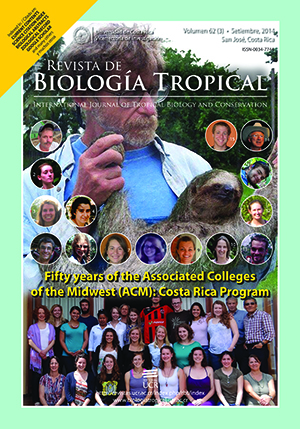Abstract
The increase of ecotourism operations within Costa Rica during the last 20yrs has brought more and more humans into close, direct contact with several wildlife species. One of these species is the white-faced capuchin (Cebus capucinus), highly gregarious, and with exposure over time, willing to come into close vicinity of humans and their developments. Such contact has its advantages and disadvantages for the ecotourism industry. We observed white-faced monkeys in order to assess the impact of human presence and development on monkey behavior, with a focus on aggressive, affiliative, and foraging behaviors in Curú Wildlife Refuge (CWR), located in Puntarenas, Costa Rica, and to ascertain the degree of over-habituation of capuchin populations at CWR. Though there exist no discrete behavioral parameters that measure over-habituation, it can be defined as an extreme state of habituation in which non-human primates not only lose fear of humans, but also actively include humans in social interactions or treat them as a food resource. We used instantaneous focal animal and group scan sampling during 8wks in March and April 2012. Two groups (approximately 20-30 individuals each) of capuchins were observed; the first near the tourist development at the Southwestern area of CWR, representing a habituated population that regularly foraged, rested, and groomed in the presence of humans. The second, was observed in the Northeastern area of CWR, did not visit the center of human activity and exhibited fear of humans. The habituated group exhibited significantly fewer instances of threatened behavior in response to human presence (p<0.0001) than the non-habituated group, and spent significantly more time eating and foraging (p<0.0001). While the habituated monkeys at CWR may not be over-habituated, they could become that way as development, especially ecotourism, increases. Over-habituation is a problem that affects capuchins in certain ecotourism sites in Costa Rica. It is critical that the consequences of habituation be studied more carefully, primarily in areas where ecotourism operations draw visitors to wildlife habitats.
Shasta E. Webb1 & Michael B. McCoy2
1Macalester College, 1600 Grand Avenue, St. Paul, MN 55105-1899; webbshasta@gmail.com
2Associated Colleges of the Midwest, Costa Rican Office, San Pedro de Montes e Oca, Costa Rica; mmccoycolton@yahoo.com
Comments

This work is licensed under a Creative Commons Attribution 4.0 International License.
Copyright (c) 2014 Revista de Biología Tropical






